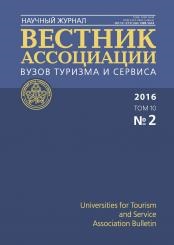The author’s prophylactic program presented in the article is due to help up psychical health of teenagers and Tourism students both, its goal is to involve in such useful and recreational activity as tourism. Tourism is able to stimulate sensory channels of reality perception, therefore why it may serve as rewarding substitution of passive computer pastime. However, it is possible only under condition of defined algorithm of actions, which should been fulfilled through mentoring system of different levels realization. The author guided by the fact that teenagers trust the information, the source of which is the coevals or the persons who are not much older. «The school of young tourist» contains three vectors of prophylactic work with teenagers: interactive programs organized by Tourist stu- dents under skilled psychologist guidance, the programs providing useful teenagers occupation and the programs conducted by the seniors. The idea of «The school of young tourist» is dictated by the target auditory need in self – improvement, track finding, depression overcoming. Such emotion as suspense is intrinsic to the young people, it appears to be the reason of their depression. The author of the article states that proposed project has powerful potential of the career guidance, it allows to create the channels of communication between university, which has «Tourism» profile and school audience seeking the trace of the future professional realization. The project «The school of young tourist» possesses high practical importance because it fits to be actualized on the platform of the majority of the universities comprising the Universities for Tourism and Service Association.
computer addiction, depression, psychical health, teenagers socialization, social-significant qualities, individual growth, stress resistance, zone of social contacts, values system, recreation, tourists technologies
1. Adler A., Nervous character. St. Petersburg: Publ. Universitetskaya kniga, 1997, 338 p. (In Russ).
2. Аnanievа Т.N, Iliukhinа G.I., Sakharchuk Е.S., The directions of activity within social partnership in profile tourist edu- cation: actualite and content. Vestnik Assotsiatsii vuzov turizma i servisa, 2015, no. 3. Moscow: Publ. UTS. (In Russ).
3. Bek A., Rash A., Sho B., Emeri G. Cognitive therapy of depression. St. Petersburg: Publ. Piter, 2003, 304 p. (In Russ).
4. Bogacheva N.V., Computer games and cognitive specifics of gamers (the end). Vestnik Moskovskogo Universiteta, Series 14 Psychology, 2015, no. 1. Moscow: Publ. MSU, pp. 94 (In Russ).
5. Bondyreva S.K. Kolesov D.B., Narkotizm. Priroda i preodolenie (Narcotization. Nature and Negotiation). Moscow: Publ. Moskovskii psikhologo-sotsialnyi institut, NPO «Modek», 2006, 432 p. (In Russ).
6. Voiskunskii A.E., Psychological investigations of Internet addiction phenomenon. Vtoraya Ros. Konf. po Ekol. Psikh. Tezisy. (Moscow, April 12-14, 2000). Moscow: Publ. Ecopsitsentr Ross, p. 251-253. (In Russ).
7. Kalugin A.U., Volochkov A.A.,, Value orientation of the students - humanitarian identity. Voprosy psikhologii, 2016, no. 4, Moscow, p.28. (In Russ).
8. Meshkova N.V., Enikolopov S.N., The research vectors of the creativity in social interaction. Voprosy psikhologii, 2016, no. 4, Moscow, p. 118. (In Russ).
9. Mitina O.V., Sorokina V.V., High school students’values: The development of the PC - based diagnostic method. Vestnik Moskovskogo Universiteta, Series 14 Psychology, 2015, no. 1, Moscow: Publ. MSUP, p. 42. (In Russ).
10. Мolchanova N.V., Training of tourism industry in regional universities. Vestnik Assotsiatsii vuzov turizma i servisa, 2016, no.1, Moscow: Publ. UTS. (In Russ).
11. Nechaev М.P., Main directions of updating and development of educating potential of tourism activities in educational organization. Vestnik Assotsiatsii vuzov turizma i servisa, 2016, no.1, Moscow: Publ. UTS. (In Russ).
12. Ostrenkova M.E., Psychological regularities of character formation all through the person’s life. Izvestia Rossiiskoj Akademii Obrazovaniia, 2016, no. 1 (37). Moscow: Publ. OANO VO «MPSU», p.113. (In Russ).
13. Smirnov P.A., Pedagogical team in the system of Service Market for children’s rest and recuperation. Izvestia Rossiiskoj Akademii Obrazovaniia, 2016, no. 2 (38). Moscow: Publ. OANO VO «MPSU», p. 85. (In Russ).
14. Frankl V., Man’s search for meaning. Moscow: Publ. Progress, 1990, 368pp. (In Russ).
15. Fromm E., Healthy society. Psikhoanaliz i kultura: Izbrannyie Trudy Karen Khorni i Erikha Fromma, Moscow: Publ. Iurist, 1995, 624pp. (In Russ).
16. Chernysheva T.L., Sobytiinyi turizm. Vidy i tendentsii razvitiia turizma: Uchebn. Posobie (Event tourism. Kinds and trends of tourism development). Novosibirsk: Publ. NSTU, 2014, p. 145-168. (In Russ).
17. Chesnokova M.G., The concept of health in context to key categories of cultural activity approach. Vestnik Moskovskogo Universiteta, Series 14 Psychology, 2015, no. 2. Moscow: Publ. MSU, p.23. (In Russ).
18. Bayley, A. Volunteer Tourism: Powerful Programs or Predisposed Participants? Journal of Vocational Education and Training, London 2012, 54 (3), p. 343.
19. Pritchard A., The critical turn in tourism studies: Innovative Research methodologies. Elsevier: Oxford, 2011, p.12
20. Wilson, E., Small, J., Harris C., Editorial Introduction: Beyond the Margins? The Relevance of Critical Tourism and Hospitality Studies. Journal of Hospitality and Tourism Management, 2012, no. 19, p. 4.





